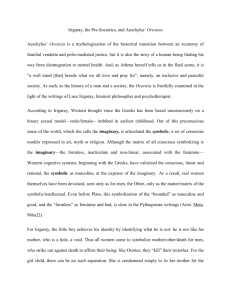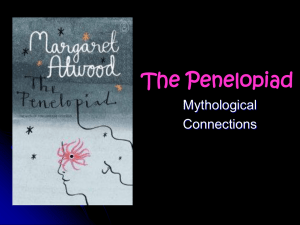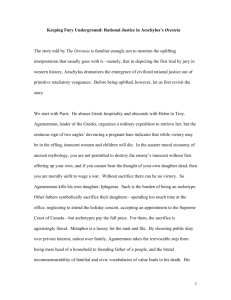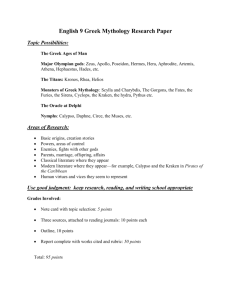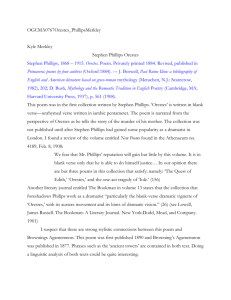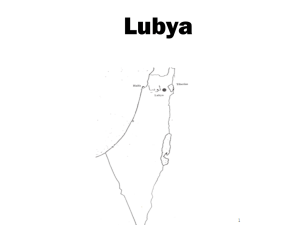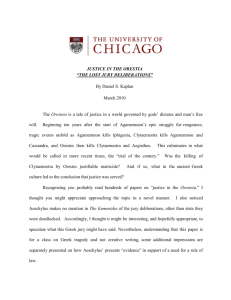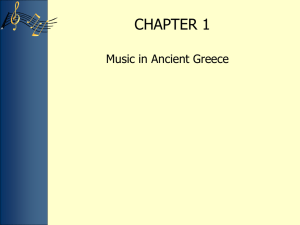The Significance of Exile in The Eumenides Rachel L. Carazo
advertisement
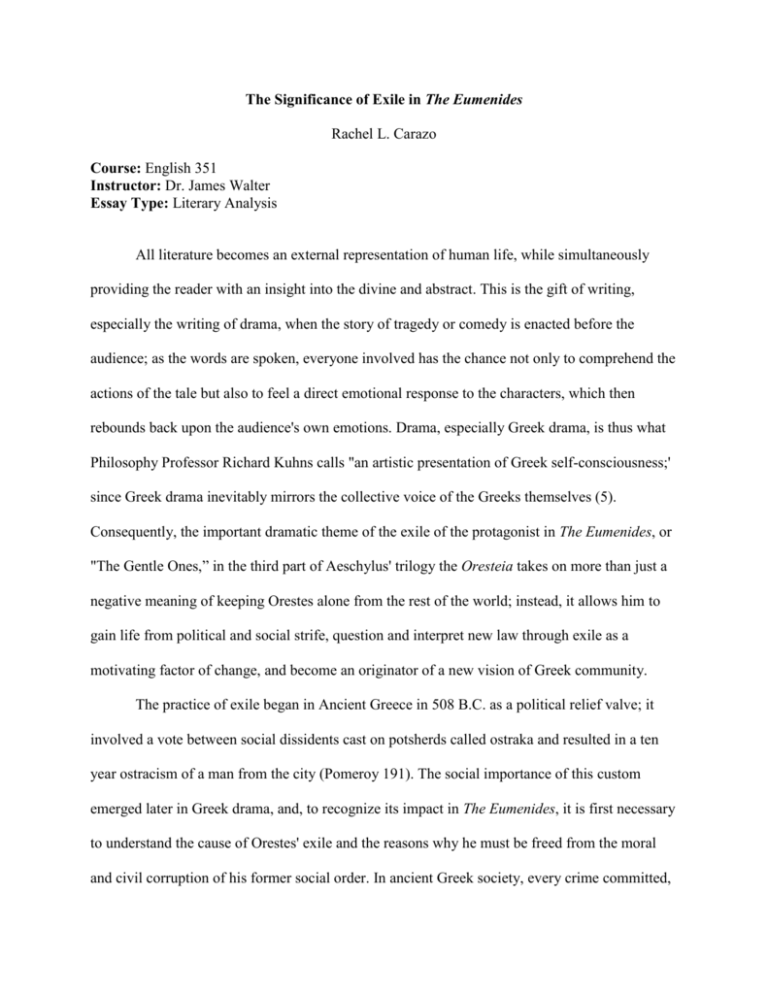
The Significance of Exile in The Eumenides Rachel L. Carazo Course: English 351 Instructor: Dr. James Walter Essay Type: Literary Analysis All literature becomes an external representation of human life, while simultaneously providing the reader with an insight into the divine and abstract. This is the gift of writing, especially the writing of drama, when the story of tragedy or comedy is enacted before the audience; as the words are spoken, everyone involved has the chance not only to comprehend the actions of the tale but also to feel a direct emotional response to the characters, which then rebounds back upon the audience's own emotions. Drama, especially Greek drama, is thus what Philosophy Professor Richard Kuhns calls "an artistic presentation of Greek self-consciousness;' since Greek drama inevitably mirrors the collective voice of the Greeks themselves (5). Consequently, the important dramatic theme of the exile of the protagonist in The Eumenides, or "The Gentle Ones,” in the third part of Aeschylus' trilogy the Oresteia takes on more than just a negative meaning of keeping Orestes alone from the rest of the world; instead, it allows him to gain life from political and social strife, question and interpret new law through exile as a motivating factor of change, and become an originator of a new vision of Greek community. The practice of exile began in Ancient Greece in 508 B.C. as a political relief valve; it involved a vote between social dissidents cast on potsherds called ostraka and resulted in a ten year ostracism of a man from the city (Pomeroy 191). The social importance of this custom emerged later in Greek drama, and, to recognize its impact in The Eumenides, it is first necessary to understand the cause of Orestes' exile and the reasons why he must be freed from the moral and civil corruption of his former social order. In ancient Greek society, every crime committed, especially that of murder as revenge for murder, plagued the social order by creating a neverending cycle of violence, which the characters from the Oresteia perpetuate. Because Agamemnon sacrificed his daughter Iphigenia in order to attain favorable winds to sail for Troy, Agamemnon's wife, Clytemnestra, enacts this revenge by killing Agamemnon after the Trojan War. Orestes believes his father deserves just retribution, both because "every impious act propagates offspring in its own image" and the god Apollo instructs him; therefore, he kills his mother and her lover, Aegisthus (Zak 33). These instances quickly establish a certain Greek social order; Richard Kuhns explains, "[t]he old religious order, because it placed the clan and cult heroes at the center of worship, tended to perpetuate the smaller political units among which there would be, inevitably, considerable conflict" (27). Unsurprisingly, this conflict becomes the main downfall of order and justice in the Oresteia and sets up the necessity for Orestes to be exiled and chased forever by the Furies, beings that execute the necessary revenge when no human is alive to do so. These Furies, or Erinyes, know exactly how to enact their duties as they determine to follow Orestes until they catch him. They offer their motivations for his exile as they chase him, with the understanding that Orestes must "keep racing on and never yield. / Deep in the endless heartland they will drive [him], / striding horizons, feet pounding the earth forever" (Aeschylus lines 77-9). In other words, Orestes must not give up his exile since to do so is to relinquish his life, for the Furies will never surrender. Thus, exile, although it expels Orestes from his home and familial duties as the new male leader of his household, actually stands as a life-giving action, rather than a murderous one, even though Orestes' death is the Furies' intent. An earlier instance which also aids Orestes in his realization that exile is beneficial occurs when Clytemnestra murders Agamemnon, stating, "the victory [she] had proclaimed for every participant is simultaneously defeat and victimization for all" (Zak 46); this understanding thus results from her actions being unmistakably destructive to the family and judicial order (Zak 46). Nevertheless, Orestes must be purged of his crime in order for a healing process to begin. The first step in his relief from the murders occurs in the temple of Apollo, since Apollo himself ordered him to avenge Agamemnon. Here, Orestes comes and "holds the seat where suppliants sit for purging; / his hands dripping blood, and his sword just drawn, / and he holds a branch" (Aeschylus 43-5). These supplications are the manner of being relieved from a sin; thus, he has the blood of a sacrificial animal upon his hands, purifying the deed as he holds a branch in peace. From this, Orestes is able to claim, "[m]y murderous edge is blunted now, worn down at last" (Aeschylus 236); this leaves him ready for the next stage of the process in his exile-an exile which again saves his life rather than destroying it, even though his own former social order is gone. However, this supplication before the divine does not completely free him from his crime. Keith Sidwell elaborates, "the purification cannot be presented as wholly effective, otherwise the Erinyes would never arrive in Athens, and the central conflict of the play would vanish" (46). Therefore, the exile cannot end here because the next important step in the journey of the protagonist is that Orestes must be able to move beyond the regular social rituals. In consequence, the second aspect of exile, involving the abandonment of one's social order to allow for a motivating force of change against the old order, occurs. Years before, Agamemnon sacrificed his daughter, since he believed the goddess Artemis required it as a trade for favorable winds to Troy. However, Agamemnon did not "trouble himself very profoundly [or] search in anxiety how the divine will could possibly demand sacrilege in this service" (Zak 65). In other words, Agamemnon never questions that perhaps the sacrifice of his daughter, even though a god seems to demand it, actually is an unjust action. So, he sacrifices her, leading to what author William F. Zak classifies as the main problem with the Greek society during Agamemnon's lifetime when he states, "though the trilogy is filled with dreadful theological predicaments and obligations to impose punishment for crime, the cycle of murderous necessities in the plays is no divine ordination. It results from the unreflective 'fatalism' of human beings whose primitive theological visions and piety go unquestioned" (38). Therefore, the trouble comes not from the fact that evil is in the Greek world, but because men in Greek society do not seek to question the most basic principles of the law when judging between good and evil. Attesting to this truth, the Furies themselves assert that men are" [b]orn for destruction only, the dark pit,” and nothing more (Aeschylus 74). They only do their supposed duty; they do not question or expand upon the sense of justice which they have been given. Stated differently by writer Keith Sidwell, the Furies "do not understand the principle at stake, but are only interested in their established function of pursuing the murderers of kin" (44). And, without any true understanding of the greater issue of justice which lies in Orestes' action, no change can come unless questions are asked about the validity of the Furies' function and the established social order itself. The Furies even try to defy Apollo, the god of reason, by attesting, "Never try to cut my power with your logic" (Aeschylus 225). As a result, the Furies stand for the old order of society and the more backward sense of justice which Orestes, by living in exile, comes to contradict. For Orestes, the motivation for this exile comes from questioning, suffering, and education. Firstly, as has already been established, "It is unquestioning piety itself that compromises the genuine virtue in their lives,” and, if Greek society cannot execute a genuine sense of justice with a comprehensive understanding of how it really functions, then the system will implode, leading men like Orestes into exile (Zak 58). The second factor requires suffering, a point which Orestes accurately makes when he states, "I have suffered into truth" (Aeschylus 1n 274). This is an important statement since, had he not been forced from his home and left to question the validity of justice, Orestes never would have thought differently upon the matter. Therefore, suffering through exile is a major proponent of change for the social and political order. And lastly, in this regard, education about other people is required, since others do not necessarily perceive and execute justice and politics in the same manner as Orestes and his family. Thus, Richard Kuhns claims that "[t]hrough his wanderings which brought him to other peoples and other forms of worship, Orestes has come to question the ancestral morality that has controlled the action and judgments of the ruling Argive family" (31). Such travels give him new ideas about life and law, which later corroborate Athena's claim that "Two sides are here, and only half is heard" (Aeschylus 441). Once these questions have been asked, the protagonist, Orestes, is able to engage in the third part of his term of exile, the allocation of a new power on himself as a man and on the community under a new form of justice. This occurs when he goes in supplication before the altar of Athena in Athens, where she comes and subsequently appoints ten men to judge the trial, "men of Greece, / [...] who will judge the first trial of bloodshed" (Aeschylus 694-95). After this, the debate between the Furies and Orestes, as represented by Apollo, ensues, allowing the new judicial body to hear the case. Athena, the higher representative of the divine in the human world, clearly expresses that, even though justice may act because of the form of law, it may not be right, and men should fear this is so, even when they believe they are already making the correct decisions. Athena clarifies this when she states, "[w] here is the righteous man who knows no fear? / The stronger your fear, your reverence for the just, / the stronger your country's wall and city's safety" (Aeschylus 714- 16). Thus, if one constantly fears one's sense of justice and governance of the homeland is not entirely correct, then vigilance will never be lost and the ability to question justice, instead of blindly following it, will be possible. This is also the point where the individual gains more power in the judicial process, since every man of the community can begin to question and interpret law based on real life problems and communal issues, rather than by simply using a template of justice without contemplation. Because Athena understands this, she casts the tie-breaking vote in favor of Orestes and tells the Furies, "you are set / on the name of justice rather than the act" (Aeschylus 443-44). In other words, the Furies are guilty of this unquestioning use of justice when they follow one manner of judging right and wrong rather than adjusting to each situation. Only through the individual, with "the action of a man coming to moral awareness,” can Orestes become a motivating factor; namely, he replaces himself as leader and imprints Greek society with a greater sense of divine, social order than sudden, unreflective acts of revenge (Kuhns 5). Of course, the influence of the Furies is not lost. Instead, the Furies are needed more than ever since it is their quality to arouse fear which inspires men in judicial processes to consider their choices. This is why Athena also tells the Furies that "you were not defeated-/ the vote was tied, a verdict fairly reached / with no disgrace to you" (Aeschylus 807-9). The Furies are not losers; in fact, they have won even greater influence in the Greek city than they had before. Therefore, the establishment of a reasoning Greek order is formed based on the ability "to reflect [on] the development of moral awareness not simply in the individual, but in a whole people who have come to an enlarged understanding of the universe they inhabit,” making the victory of the play two-fold for the individual and society (Kuhns 6). In conclusion, the theme of exile in Aeschylus' The Eumenides, the third part of the Oresteia trilogy, actually becomes a positive force when it uses Orestes to atone for the mistakes of the self-destructing social order of Ancient Greece; specifically, Orestes is permitted to live and understand the faults of this system, to question anew the laws in order to change them, and to originate a new, divinely-constructed version of himself and Greek community which had so far been unimagined. According to William F. Zak, "the institutions and rites [Athena] introduces promise, as nothing else in The Oresteia begins to do, a possible amelioration of the conduct and consequences of the domestic, civic and religious lives of its people,” giving new life to Greek society (32). As a result, it is not surprising that, in the end, the Furies, originally only figures of fear and vengeance, become promoters of life and of the city; they even thank the goddess for the battle between the two social orders, stating, "[t]hanks to our duel for blessings; / we win through it all,” for without the struggle no positive changes can ever occur (Aeschylus 986-87). Works Cited Aeschylus. The Eumenides. The Norton Anthology of World Literature. 2nd ed. Ed. Sarah Lawall et al. New York: Norton, 2002. Kuhns, Richard. The House, the City, and the Judge: The Growth of Moral Awareness in the Oresteia. Indianapolis: Bobbs- Merrill, 1962. Pomeroy, Sarah B., Stanley M. Burstein, Walter Donlan, and Jennifer Tolbert Roberts. Ancient Greece: A Political, Social, and Cultural History. New York: Oxford UP, 1999. Sidwell, Keith. "Purification and Pollution in Aeschylus' Eumenides.” The Classical Quarterly. 46(1996): 44-57. Zak, William F. The Polis and the Divine Order: The Oresteia, Sophocles, and the Defense of Democracy. Lewisburg: Bucknell UP, 1995. Dr. Walter's Comments: In this very thought-provoking essay Rachel draws on studies by several classical scholars to build her argument that Orestes' exile in Aeschylus' Eumenides actually serves a positive function. It gives the young hero space and freedom to encounter other cultures and to contemplate human goods that surpass the needs of a moment. In clarifying the play's central insight - that it is only by questioning the blood-lusting justice of the myopic Furies that their demands can be incorporated within a much broader understanding of justice recognized as a divine gift with promise of a blessed future - Rachel shows the relevance of a great classic to every passing present.
